IRIS ROMANIA
ISRA Center
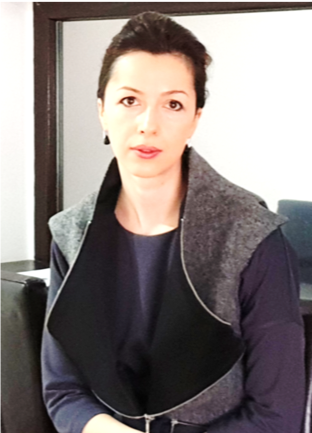
Alina Dincă
Managing Director & Research Consultant

-
Vitan Center Building, 1st & 2nd Floor
23C Calea Vitan, District 3
031281, Bucharest
Romania
- Email: alina.dinca@isracenter.com; rfq@isracenter.com
- Website: http://www.isracenter.com
- Phone: +4 021-326-65-78
Alina Dincă is the Managing Director of ISRA Center.
She has been working in market research for 16 years, providing support and consultancy to all research teams, particularly in the pharmaceutical and FMCG sectors.
With a broad expertise on the local market, Alina manages the business relation with current partners and develops new business opportunities.
She always encourages innovative ideas and support ISRA teams with implementing them for the benefit of the company and its clients.
COMPANY INFORMATION
ISRA Center is a client-driven, full-service marketing research company that has the ability to fulfill clients’ research needs from the initial stages of problem identification and consulting services to design, execution, analysis and recommendations. We connect people, brands and markets through artful research and support our clients in taking steps towards better decisions.
Established in 2001, ISRA Center has extensive marketing research experience in Romania and has conducted hundreds of qualitative and quantitative research projects on a wide range of brands and topics. We have impressive credentials in FMCG (food and non-food), healthcare, telecommunications and services.
The company has a comprehensive exposure in the region as it is also involved in CEE projects.
Ever since 2010, ISRA Center has been the exclusive representative of IRIS Network in Romania.
CLIENTS PORTFOLIO

AstraZeneca

British American Tobacco

Carlsberg

GlaxoSmithKline

Müller

Strauss
PUBLICATIONS
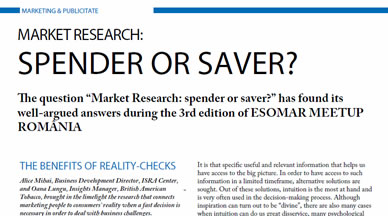
The question "Market Research: spender or saver?" has found its well-argued answers during the 3rd edition of ESOMAR MEETUP ROMANIA.
Alice Mihai, Business Development Director, ISRA Center, and Oana Lungu, Insights Manager, British American Tobacco, brought in the limelight the research that connects marketing people to consumers’ reality when a fast decision is necessary in order to deal with business challenges.

After the first 8 months of 2012, when FMCG market grew by 2% in value, the end of the year brought a decrease in consumption for most product categories
A cautious but normal attitude, occurred against the background of socio-economic and political changes which also translated into a decrease in basket value in the hypermarket. Although the only one which managed to register an increase in purchase frequency, not even the traditional retail succeeds in exceeding a mean value of the sales receipt of 25 lei.
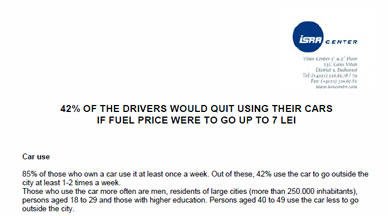
42% of the drivers would quit using their cars if fuel price were to go up to 7 lei
85% of those who own a car use it at least once a week. Out of these, 42% use the car to go outside the city at least 1-2 times a week. An increase in the gasoline/ diesel fuel price up to 7 lei would make 42% of those who use the car to think about quitting driving it.
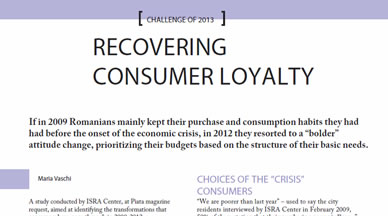
If in 2009 Romanians mainly kept their purchase and consumption habits they had had before the onset of the economic crisis, in 2012 they resorted to a "bolder" attitude change
Despite a continuous state of dissatisfaction and confusion manifested throughout the past 4 years, Romanians managed to permanently find ways to adapt to and manage the economic downturn in everyday life: from a hesitating and cautious purchase behavior in 2009, they currently switched to rational and pragmatic purchases.

The snack between meals remains the main occasion, given that more than half of the respondents state that they choose biscuits when they feel the need for something sweet
Romanians are not big biscuits consumers. The most popular category of biscuits, the plain biscuits, is consumed at least once every 2 weeks by only 30% of the Romanians in the urban area. Every day, plain biscuits are consumed by 2% of the respondents and once a week by 11% of them.
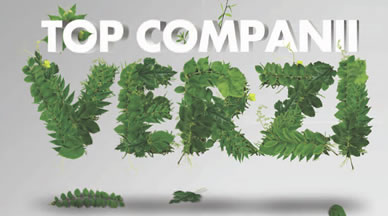
Although research on green CSR campaigns is still at the beginning in Romania, ISRA Center has been actively involved in this type of strategic projects in the recent years.
The green territory has narrowed its borders in the recent years. Due to the economic difficulties, the companies that still allot dedicated funds are those pillared on social responsibility. These companies are the avant-garde of things well-done in sustainability. They are the reason we decided to make a top of the green companies in Romania.

Boosting consumption frequency - the main challenge on milk market
Although fresh, plain milk without flavours is consumed by 87% of the Romanians in the urban area, only a third include it in their daily menu, which means that, on the medium term, the category could grow especially by boosting consumption frequency.

The prolonged recession increases the trial rate of private labels
The visit frequency for each type of store remained constant during last year, but the average amount spent decreased. The only exception from the rule is coming from hypermarkets, where there was a slight increase. Equally interesting is the fact that most of the new products tried by Romanians in the last month are retailers’ private labels.
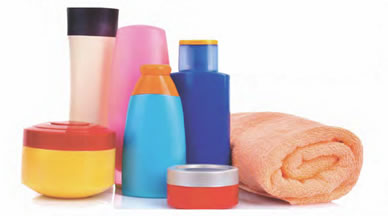
How households get involved in the purchase of personal care products
A survey conducted by ISRA Center identifies buyers, decision makers, and influencers profiles for six products segments from the category of personal care products.
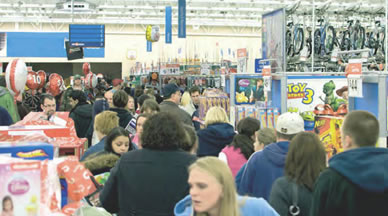
How to 'hook' shoppers
Research conducted by ISRA Center, has identified four segments of shoppers, starting from the attitudes they have during the purchase of consumer goods as well as the opportunities these groups generate for retailers.

The average shopping basket value decreased in the first semester
Despite the much talked about economic revival, the numbers related to trade evolution for the first half of the year show quite the opposite. The first signal comes from the National Institute of Statistics, which reports a decline of the en-detail trade with 6.2% in January – June 2011 compared to the same period last year, based on sales decrease with 9.7% for food, drinks and tobacco.
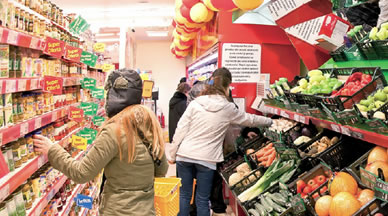
Almost half of the Romanians in urban areas go to a traditional store every day
Products with a high percentage in the shopping basket, which are part of strictly necessary categories and satisfy primary needs, are also the ones to register a positive dynamic, increasing the percentage in the basket even more.

Only 4 in 10 customers usually ask for info on the products purchased
Most shoppers do not ask questions and do not ask for additional info from the sales personnel in traditional retail.
On the other hand, few sellers make the effort to initiate a conversation with the shopper by spontaneously offering advice.

Consumers on stores performance. Traditional vs. Hyper / supermarket vs. Discount
Promotions and competitions are part of stores’ daily routine, therefore buyers do not pay much importance to them when evaluating any retailer as they got used to these actions being part of stores’ usual offer. Nevertheless, there is room for improvement in all cases. Retailers in Romania have focused little on the emotional attributes of communication programs. However, traditional as well as modern stores perform well when it comes to the atmosphere inside the unit. This is not yet an important criterion for consumers, but it can be seen as an opportunity to exploit in the future.
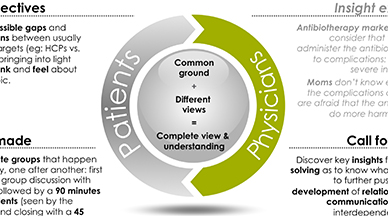
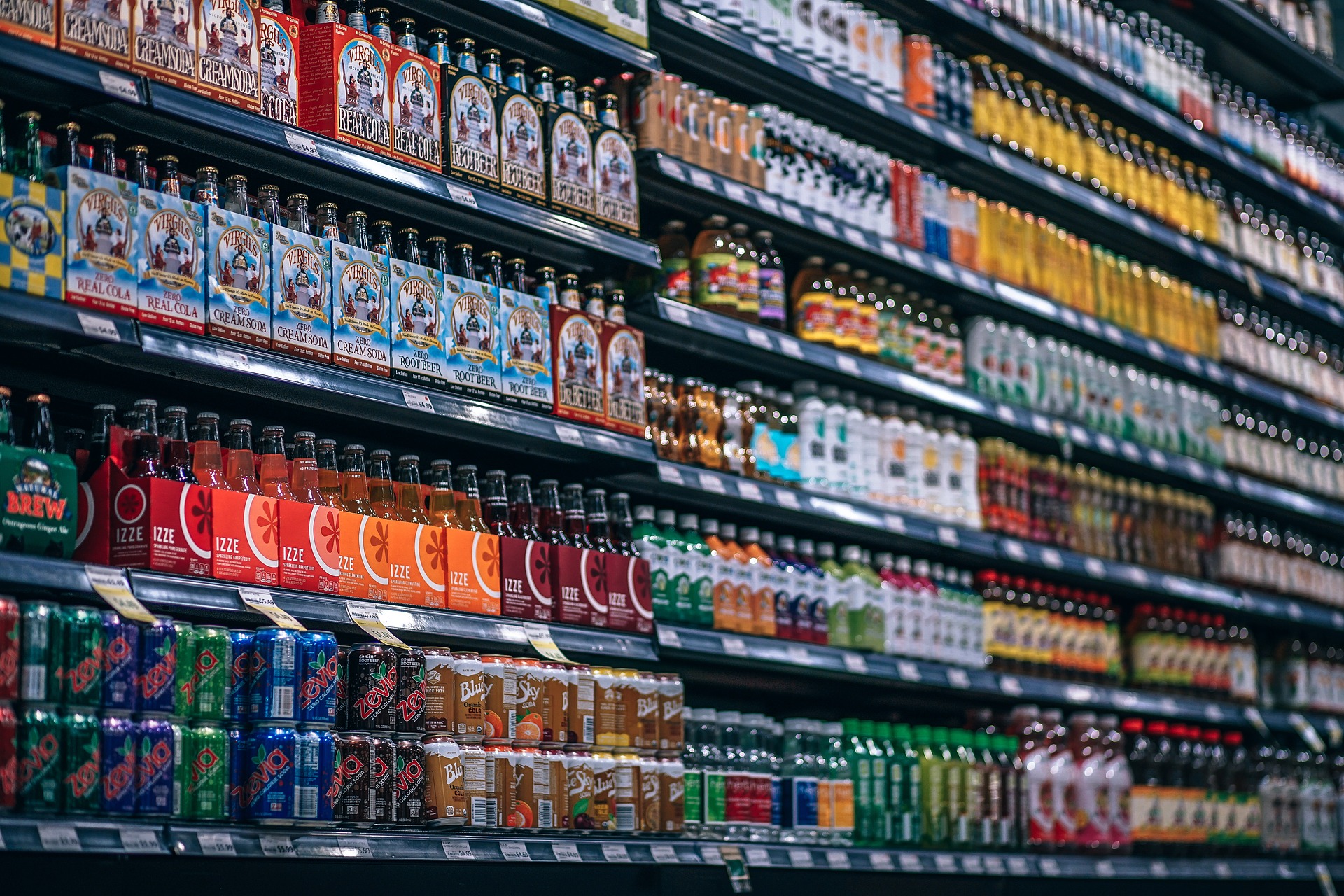
Brand loyalty is a shortcut to quick purchase decisions
In March 2018, ISRA Center Marketing Research finalized the study "Brand (New) Loyalty in Romania, in 2018. How human is your brand". The purpose of the study was to identify how brands succeed in earning and preserving consumer loyalty, in digital age

Consumer Purchase Behavior & Coping Strategies Study (in the context of rising prices)
9 out of 10 people in Romania are affected by the increasing prices, and brand loyalty seems threatened, as 45% of consumers have already tried cheaper brands. Is this all around the globe? Check this presentation by our Romanian Member!


